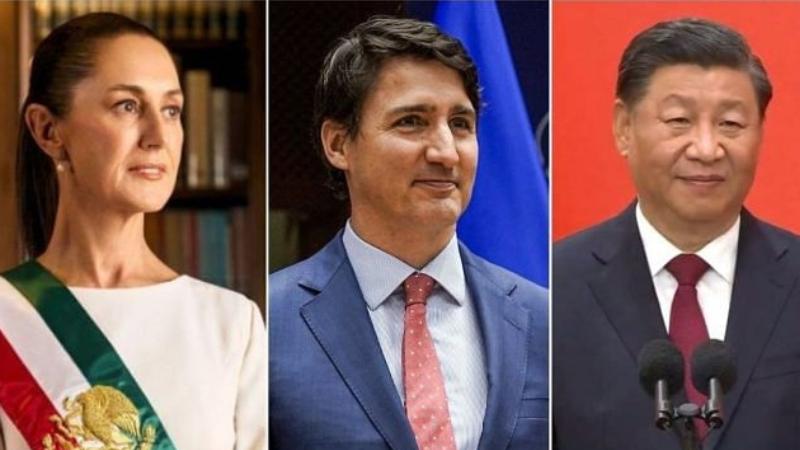
The latest round of tariff hikes by US President Donald Trump has triggered immediate countermeasures from Canada, China, and Mexico, escalating tensions in global trade. Beginning Tuesday, the US is imposing a 25% tariff on imports from Mexico and Canada while also raising tariffs on all Chinese imports from 10% to 20%. In response, these nations have announced their own economic retaliations, signaling a sharp rise in trade disputes.Canadian Prime Minister Justin Trudeau and Chinese officials have condemned the US measures, calling them unjustified and harmful to international trade. Mexico’s President Claudia Sheinbaum has also vowed to introduce economic responses, further intensifying concerns about potential inflation and supply chain disruptions.
Canada to Impose 25% Tariffs on US Goods
Canadian Prime Minister Justin Trudeau announced that Canada will impose 25% tariffs on US goods in response to Washington’s latest trade restrictions. Trudeau criticized Trump's decision, warning that it would increase prices for American consumers and risk thousands of jobs."Because of the tariffs imposed by the US, Americans will pay more for groceries, gas, and cars, and potentially lose thousands of jobs," Trudeau stated.The Canadian tariffs, worth $155 billion Canadian, will be implemented over a 21-day period, with an initial wave of $30 billion in tariffs starting Tuesday at midnight. Trudeau emphasized that these measures are necessary to protect Canada’s economic interests and maintain fair trade relations.
China Announces Tariff Hikes on US Agricultural Products
China has responded swiftly to Trump’s tariff escalation by announcing new levies on US agricultural and food products, including chicken, wheat, corn, and cotton. The Chinese Finance Ministry confirmed that Beijing will impose a 15% tariff on US poultry and grain products and an additional 10% tariff on soybeans, pork, beef, aquatic products, fruits, and dairy imports from March 10.In addition, China has placed 25 US firms under export and investment restrictions, a move that could limit American businesses' access to Chinese markets. The Chinese government has indicated that these countermeasures are necessary to safeguard its economic stability and counteract US trade aggression.
Mexico’s Response and Economic Countermeasures
Mexican President Claudia Sheinbaum has also vowed to retaliate against Trump's tariffs, though specific details have not yet been disclosed. Mexico’s economy ministry stated that official measures will be announced during President Sheinbaum’s morning press conference on Tuesday.Previously, Mexico had managed to avoid earlier US tariffs by strengthening security efforts at its northern border and negotiating last-minute trade deals. However, the latest wave of US tariffs has put Mexico under renewed economic pressure, leading the government to explore alternative strategies to mitigate financial losses."We have a Plan B, C, and D," Sheinbaum stated, reinforcing her administration’s commitment to protecting Mexico’s trade and economy.
Trump Justifies Tariff Strategy Amid Economic Concerns
President Trump defended his tariff policy, insisting that the measures will boost US manufacturing and attract foreign investment. The White House maintains that higher tariffs will encourage businesses to shift production back to the US, reducing dependence on foreign imports.However, the economic impact of these tariffs has raised serious concerns among investors and analysts. The increased costs of goods, particularly raw materials, consumer products, and agricultural supplies, could drive inflation and slow economic growth.Renowned investor Warren Buffett has strongly criticized Trump's tariff approach, calling it a "tax on goods" that will ultimately hurt consumers."Tariffs are actually - we've had a lot of experience with them - they're an act of war, to some degree," Buffett stated in a recent interview with CBS. He warned that continued trade disputes could harm the global economy and reduce investment confidence.
Global Economic Impact and Market Reactions
The escalating trade war between the US, Canada, China, and Mexico has already begun affecting global stock markets, with investors reacting cautiously to the uncertainty surrounding trade policies. Analysts predict that prolonged trade tensions could disrupt global supply chains, increase costs for businesses, and slow down economic recovery. As more countries prepare to counteract US tariff policies, the coming weeks will be crucial in determining how trade relationships evolve. Whether negotiations will ease tensions or further retaliation will ensue remains uncertain, but businesses and consumers worldwide are bracing for the economic impact of these escalating trade disputes.












































